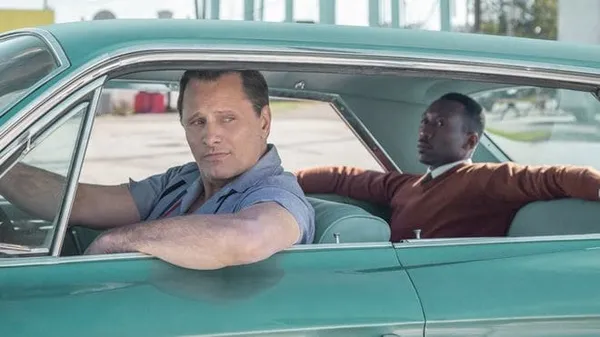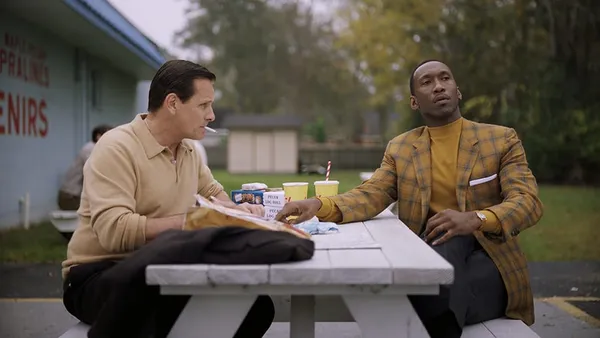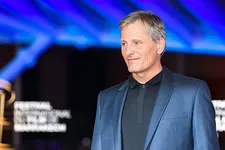 |
| Mortensen and Ali in Green Book Photo: Courtesy of Toronto Film Festival |
Green Book star Viggo Mortensen has been nominated for an Oscar for the role of Tony Lip in Peter Farrelly's film, which relates how Lip's Italian-American bouncer becomes the driver for classical pianist Don Shirley (Mahershala Ali, who is also Oscar-nominated) set to tour the southern States of the US.
The film - which won the coveted People's Choice award at Toronto Film Festival last year, often an indicator of Oscar success - has had its fair share of controversy since its release in the States. The family of Shirley wrote a letter to the media condemning the film and there have also been problems for co-writer Nick Vallelonga, who was forced to apologise after anti-Muslim tweets he had posted about 9/11 resurfaced. Even Mortensen himself ran into trouble after using the n-word (in the context of trying to show how much progress has been made against such slurs) at a post screening discussion.
When I chat to the star at the Marrakech Film Festival, I ask him whether he thinks its easier to address racism through a period piece than something set in the present and while he agrees that that is "maybe easier to draw lessons from it in the present", before quickly changing tack to talk about perceived criticisms of the film.
He says: "I've heard odd comments from people who feel the film should be more militant or more cutting edge. There's all kinds of movies. Comparing movies is ridiculous sometimes. And to say that this movie isn't significant because it's set in the past and is a Hollywood movie. No, it deals with some very painful and awkward and difficult and troubling issues head on but there is humour in the movie.
"But above all, other movies tell you what to think, demand that you feel something and demand that you think about an issue. That's fine, some movies are really well made that do that. This movie doesn't tell you to think or do anything. It invites you to think, it invites you to feel if you want to. It invites you to learn a civics lesson, a history lesson, it's all there.
 |
| Viggo Mortensen: 'I wanted to learn about the person so that I can show him without judgement' Photo: Universal Pictures |
"Each time I see the movie, I see more layers to it, just like each time I read it I felt that way. It's a lot more complicated than it looks on the surface, because Pete Farrelly did such a good job writing and directing this that it looks easy, it looks simple - it's not simple at all. Some people say, 'It's a Hollywood ending'. Well, it happens to be true, that's how Nick Vallelonga met this guy, on Christmas Eve when he was a little boy. That happened. And the things that are in the movie are true to what that real-life journey was.
"When I've heard certain people, whether it's film critics or audience members - it's a minority - but certain people going, 'It's not gritty enough. Well, it's a movie, first of all, that people will see in Kansas and in small towns in northern England and hopefully everywhere, because it is really well made, it's entertaining, it's funny, it's a great buddy story, a great road movie. They're not going to go see it on Friday night with the family because, 'Oh, I hear there's this great movie about racism'. 'What else is playing?' is what they would say.
"But they will get those same lessons, they will get that same experience. They will think about the present. Kids will ask their parents, 'Is that really the way it was?' and if the parents don't know they'll Google and find there were laws that, after the sun went down, if you were black you couldn't be out on the street. It's insane."
The 60-year-old says that he prepares for his roles by a process which he refers to as "gathering" - beginning his approach by taking a script and asking, "What happened before page one?"
He adds: "I gather all this stuff - it's almost like a junk house by the end, full of ideas and notes and photographs and, in this case, fortunately, voice recordings of the real guy. But then when it comes down to it you have to put all that aside and trust that you've kind of digested it. Then I've just got to listen to Mahershala or Linda Cardellini and react and trust that these things are going to inform how I react.
"What I do is I don't want to make a caricature, like a cartoon. I don't want to imitate Robert De Niro or Joe Pesci or any movie idea of anything. I just want to do justice to this person, who happens to be a real person who existed - he died in 2013 - just like Mahershala wanted to do the same. I wanted to learn about the person so that I can show him without judgement. So this charm or his heart is an open book, that's how he was, that's what I learned about him and you just have to do it."
Mortensen says he looks to children for inspiration when it comes to acting, adding: "I think a lot of it has to do with not judging because if you're judging then you're rigid and if you're not judging then you're playing, like a little kid."
Noting that young kids playing make believe and pretending to be a princess or a pirate "don't need a director and they don't need 'take two' because it's perfect, he adds: "They're completely involved, it doesn't matter if they have a crown or not, they are the king. As a parent, watching, it's unquestionable, this person is the king. So that's what you try to get back to as an actor. Complete abandon but with technique."
His technique this time, also included the need to gain quite a bit of weight for the role - at one point his character is seen folding up a pizza for a late-night snack - and the actor says it was something he needed to keep up.
He said: "It was difficult when about halfway through the shoot, I realised if I didn't keep eating a lot then the weight would go down a little and then the costume people would say, 'Tut, tut, the pants... you have to pick up the pace again'. It was much harder to lose the weight than to gain it, obviously.
"That was the easy aspect of preparing the part. I never want to do a caricature. I always want to play every part I play, whether it's similar to me in some way or very different, like this one, I always want to understand the point of view of the character. I don't want to judge the character because I don't want the spectator to judge. I want the character to think and feel like it's a real person. In this case, it was a lot different, the point of view, the education, experience of life, so it was just a question of listening to the family and learning as much as I could."
Speaking about the timeliness of the film's release, he says: "Some people have said to me, 'Things are so screwed up right now in the United States.' And I've said, 'Well, everywhere'. Anti-immigrant sentiment, racism, fear of the other, that's everywhere, and the manipulation of that by people who should lead by example, like politicians and heads of corporations. But they don't because they see profit and power in not doing so.
 |
| Viggo Mortensen at Marrakech Film Festival. Photo: Marrakech Film Festival |
"People said to me, 'This is the perfect time, this is the best possible time for this movie to come out'. I said, 'It's a good time, it would have been a good time 10 years ago and it will be a good time 30 years from now to watch this movie.' Because, discrimination and racism, much as we want them to go away by the laws we pass, by the evolution we hopefully have as human beings - it will never go away. It's a human thing. A tribal thing that happens with every generation in every place in the world and it always will.
"Instead of looking at is as a horrible thing that exists, look at the challenge as a beautiful thing. You start as kids playing when you're little - I remember playing with all kinds of kids and not thinking what colour they were, what language they were speaking or even if I could understand them or the fact that they might be deaf or blind or missing a hand. You're just, like, 'Well, how do we play with one hand. Let's do a game where we both play with one hand.' Whatever, you just don't even think about it.
"And then you learn, even if you have a nice family, somehow, it's very human, you learn to see differences. And, eventually, to see yourself as being superior, inferior or totally beside the point. We learn these things, no matter how nice your environment is, it happens. Then it's reinforced by idiots who are in charge. But it happens anyway, even without them. Then you hope that people will, in their life at some point - adolescence, hopefully, but probably later - relearn to play nice again, basically. And this is going to happen every generation. I'm sorry to break the news. Now, that's my conclusion from thinking about those issues before making Green Book but even a lot more making it. Yes, it's a good time for it to come out. But any time is a good time for a well made movie about a serious subject to come out."
Green Book is out on general release in the UK now.
























